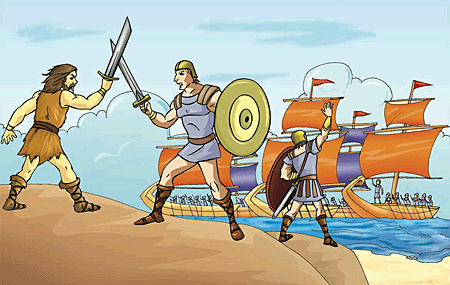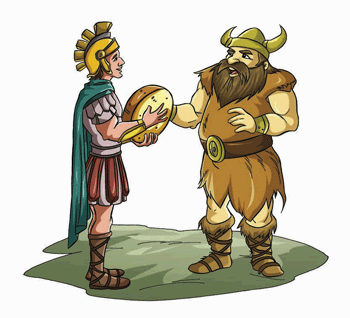English and Its Historical Development, Part 09
(the last Roman legions and trained British auxiliaries withdrew from Britain)
In A.D. 410, The last Roman legions and trained British auxiliaries withdrew from Britain, leaving the Celts to defend themselves against the Picts and Irish

As the fourth century closed, Britain remained Roman and its cities endured, but the Roman Empire as a whole was in desperate circumstances.
An entire Germanic tribe, the Visigoths, had crossed the empire's Danube frontier in 376 and, by the first decade of the fifth century, was threatening Rome itself.
As Roman troops withdrew from Britain and the Rhine frontier to strengthen the defenses of Italy, Gaul and Britain were left exposed.
In the winter of 406, a mixed multitude of Germanic invaders poured across the frozen Rhine into defenseless Gaul, virtually cutting Britain loose from the empire.
In the chaos that followed, an ambitious general, Constantine III, led what was left of the Roman-British troops southward across the Channel in an abortive attempt to save Gaul for the empire and to win an imperial title for himself.
The year A.D. 410 marked the essential termination of Roman authority in Britain
So it was in A.D. 410, that the Visigoths entered Rome and pillaged the city for three days. At about the same time, since Britain was stripped of its Roman legions, it was struck hard by barbarian raids.
A letter of A.D. 410 from Emperor Honorius to the civitates of Britain, evidently in response to their appeal for military help, commanded them to take care of their own defenses.
With the Visigoths rampaging through Italy, there were no Roman troops available for any remote British outposts.
So, in order to stem the threat to Rome, Britain was denuded of its defenses, and in the course of this process the ranks of the remaining local legions were eroded by defections, revolts, and mutinies.
The Roman legions and administrators were gone for good, leaving Britain "stripped of its armed men, its military suppliers, and the whole flower of its active youth", according to Bede in his Ecclesiastical History of the English People.
While the Romans were in Britain, some Roman terms were being integrated into the language.

As shown in this picture, we have one of a few items which had some relationship with Latin: caseus in Latin, Kaese in Anglo-Saxon (German), and cheese in English.
Latin did not replace the Celtic language in Britain as it did in Gaul. Its use by native Britons was probably confined to members of the upper classes and the inhabitants of the cities and towns.
On the whole, there were certainly many people in Roman Britain who habitually spoke Latin or upon occasion could use it; however, its use was not sufficiently widespread to cause it to survive the upheaval of the Teutonic invasions as the Celtic language survived.
The use of Latin is believed to begin a decline after A.D. 410, the approximate date at which the last of the Roman troops were officially withdrawn from Britain.
Scholars are convinced that the use of Latin as a spoken language did not survive very long after the end of Roman rule in the island and that such vestiges which remained for a time were lost in the disorders that came with the Teutonic invasions.
There were no opportunities for direct contact between Latin and Old Elnglish in England, and such Latin words as could have found their way into English would have had to come in through Celtic transmissions.
A few words are thought for one reason or another to belong to this period: port (harbor, gate, town) from Latin portus and porta; munt (mountain) from Latin mons, montem; torr (tower, rock) possibly from Latin turris; and again, possibly from Celtic, wic (village) from Latin vicus.
It is possible that some of the Latin words which the Teutons had acquired on the continent; such as, street (Latin strata via), wall, wine, etc, were reinforced by the presence of the same words in Celtic.
Latin influence remains very slight of all the influences which Old English owed to contact with Roman civilization
Although it is not surprising that the Romans borrowed little, if anything from the Celts, it is extraordinary that they themselves left such a small imprint on the speech of Britain at the time.
So thoroughly did the Romans mold and civilize the English Celts that for many years after the withdrawal of the Roman legions, the inhabitants still proudly called themselves Romani
Despite such claims, linguistic scholars can find only a minimal sprinkling of Latin words, other than the elements of place names, which entered the English word list as a direct result of the Roman occupation.
Proceed to Part 10, Old English Period.
INDEX or Table of Contents, English and its historical development.
References: sources of information.
